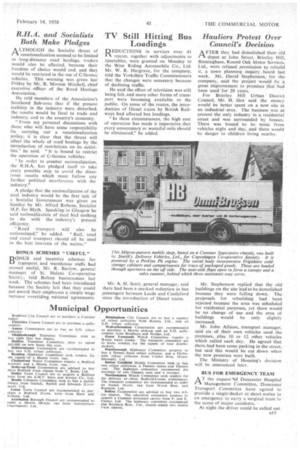R.H.A. and Socialists Both Make Pledges
Page 49

If you've noticed an error in this article please click here to report it so we can fix it.
LTHOUGH the Socialist threat of renationalization seemed to be limited to long-distance road haulage, traders would also be affected, because their freedom of choice would end, and they would be restricted in the use of C-licence vehicles. This -.warning was given last Friday by Mr. R. Morton Mitchell, chief executive officer of the Road Haulage Association.
He told members of the Association's Southend Sub-area that if the present Stability in the industry were disturbed, the results would be fatal to trade and industry, and to the country's economy.
"From my personal discussions with those who will have some responsibility foi carrying out a renationalization policy, it is clear that the threat will affect the whole of road haulage by the introduction of restrictions on its activities." he said. "It is bound to restrict the operation of C-licence vehicles..
"In order to combat natiorialization. the R.H.A. has pledged itself to take every possible step to avoid the disastrous results which must follow any further political interference with the industry."
A pledge that the nationalization of the steel industry would be the first task of a Socialist Government was given on Sunday by Mr. Alfred Robens, Socialist M.P. for Blyth. Speaking in Glasgow he said nationalization of steel had nothing to do with the industry's present efficiency.
"Road transport will also be nationalized," he added. "Rail, " road and canal transport should all be used in the best interests of the nation."
BONUS SCHEMES " USEFUL "
BONUS and incentive schemes for transport and warehouse staffs had proved useful, Mr. R. Barlow, general manager of St. Helens Co-operative Society, told Bolton businessmen last week. The schemes had been introduced because the Society felt that they could not award their employees a simple wage increase overriding national agreements.




















































































































